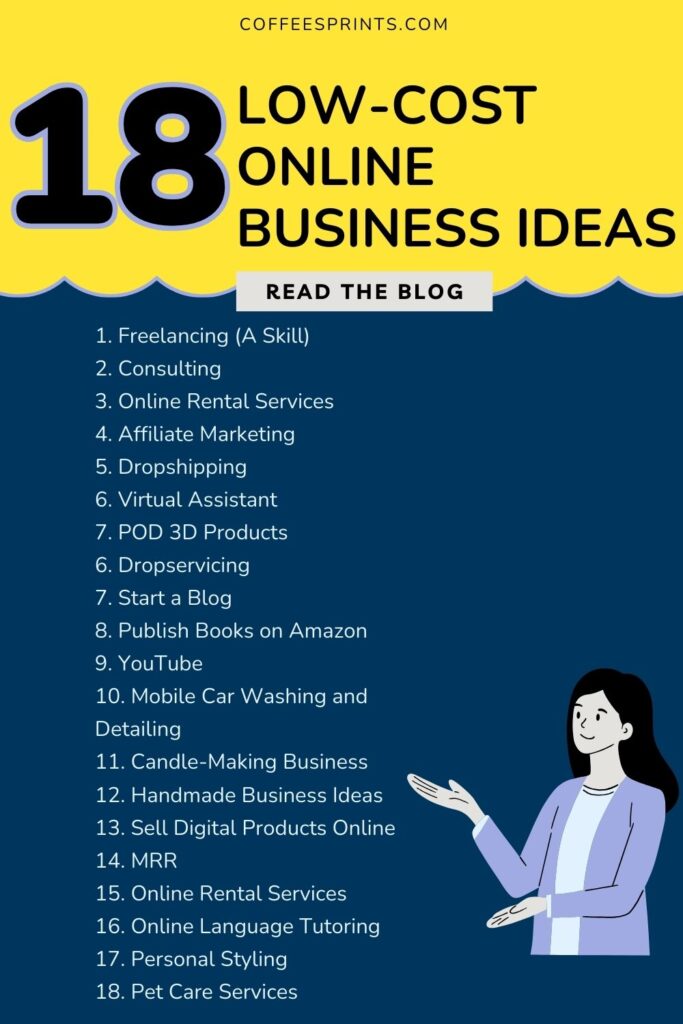18 Online Business Ideas With No-Low Investment | Make Money Online
Today, entrepreneurs have more opportunities to run businesses than ever.
From blogs to handmade to Amazon FBA businesses, there really is something for everyone!
Let’s start this article with a quick hack!
The best kind of business to start when you don’t have money is a service business—offering a service to clients for monetary benefits. You’d need a minimum number of things to get started, like a Social media profile, portfolio, and a few testimonials (good to have). You’re good to go!
In this article, we’ll discuss two key aspects of making money online: high-income skills and online business ideas that can be started with little to no investment.

High-income skills to make money online
Don’t have money to start a business? Use an existing skill to make money, if not a hobby.
Here are a few high-income skills if you want to learn one.
- Data Analytics
- Designing
- Proficiency in multiple languages
- Digital Marketing
- Social media management, a branch of digital marketing
- Bookkeeping
- Photography skills
- Programming and coding
- Sales and persuasion skills
- Project management
- A personal trainer or fitness coach
- App development
- Content creation
Any of these skills + in-demand niche + proven business model = You’re good to go! (with a bit of persistence)
For your clarity, health, wealth, or relationship are some of the evergreen in-demand niches.
Let’s get started with online business ideas with little/no investment.

1. Freelance Your Skill
Freelancing is the simplest way to turn your skill into cash. Let’s say you’re good at writing, coding, or designing—you can start offering these services to clients online. All you need is a platform like Fiverr or Upwork, where you create a profile and list your skills. It may not be easy for many freelancers to find their gig within a few days. So, strengthen your profile by showcasing your skills on your Instagram account, LinkedIn profile, or a personal website with your portfolio.
You’re basically deciding your rates, work hours, and the type of projects you want to take on. A few great testimonials would be a good start, though.
2. Consulting
“How is consulting different from freelancing?” you ask.
Simple! Freelancing is task-based, while consulting is strategy-based.
When you’re freelancing, you’re hired to do specific jobs—like designing a logo or writing an article. In consulting, you’re hired to provide advice or strategies, often for higher-level decision-making (maybe along with some tasks).
For example, if you’re great at digital marketing, instead of running ad campaigns (freelancing), you can offer consulting services to help businesses build long-term marketing strategies. You can charge a premium for your expertise!
Now, coming back to the previous point—having a single skill can open multiple options. For example, if you’re a skilled coder, you can freelance for companies, teach aspiring coders, or even create a coding course and sell it. You could also write a coding book and sell it on Amazon! There are so many ways to monetize a high-income skill.
Here are a few examples to help you come up with your own set of online business ideas:
- Know multiple languages? Start online language tutoring.
- Love fitness? Become a personal trainer.
- Great at planning? Offer concierge services.
3. Online Rental Services
Rent out items that are in demand, like photography equipment, camping gear, or even digital assets like domain names or design tools.
You can use platforms like Fat Llama for physical items or set up a personal website to rent out digital assets.
4. Affiliate Marketing
Ever notice how influencers promote certain brands or products on Instagram or YouTube? Chances are, they’re making money through affiliate marketing. In a nutshell, here’s how it works–you promote someone else’s product, and whenever someone buys through your unique link, you get a commission.
You don’t have to worry about creating or storing products. Just focus on marketing them, driving views (traffic) and sales (conversions).
For example, if you have a blog or YouTube channel, you can start promoting products that fit your audience. This is a great way to generate passive income!
Suggested Read: 30 Ways to Make Money Online
5. Dropshipping
The list isn’t complete without the famous Dropshipping.
Essentially, you start an online store without having to worry about inventory or shipping. Here’s how it works: you set up a store (say on Shopify or Woocommerce), list products of your interest (you don’t actually own), and when someone places an order, the product gets shipped directly from the supplier to the customer.
You never handle the product or the inventory. You need to market the products and manage your store. It’s low-risk because you don’t need to invest in stock upfront, but you may need to spend some money on ads to drive traffic or spend time to build organic traffic.
6. Virtual Assistant
If you’re organized, love planning, and can handle multiple tasks, becoming a Virtual Assistant (VA) might be your calling. VAs are in demand to handle tasks like scheduling, emails, social media management, and even customer support for small businesses and busy entrepreneurs. These tasks aren’t hard to start with if you know basic computer skills. You just need some basic tools: a computer, internet connection, and good communication skills. Once you start the business, you can always learn on the go when needed.
The best part? You can work from anywhere and set your hours. Platforms like Fiverr, Upwork, and even LinkedIn are great places to start pitching yourself as a VA.
7. Print-on-Demand 3D Products
While print-on-demand for clothing and accessories is common, you can expand into niche markets by offering 3D-printed items, such as custom jewelry, phone holders, or miniatures.
Partner with 3D printing services like Shapeways to create and sell unique products without needing inventory.
6. Dropservicing
Dropservicing is similar to dropshipping but for services instead of products.
Let me explain – You’re basically the middleman, offering a service that someone else provides. This works well if you’re some one with a strong network or love to network and you know where to find talented freelancers for a particular job.
For instance, you offer web design services to a client, but instead of doing it yourself, you hire a freelancer to complete the task. You pocket the difference between what you charge the client and what you pay the freelancer.
But the key to success is finding the right clients and managing the process smoothly.
7. Start a Blog
Starting a blog isn’t going to make you rich overnight. But if you’ve got the time and passion for writing, it’s one of the best low-cost businesses to start. Over time, as your blog grows and gets more traffic, you can monetize it through ads, sponsored posts, affiliate marketing, or even selling your own products.
You can earn on an average of $100-$10,000 depending on the views and niche you write about.
Yes, the key is consistency and finding a niche that attracts readers and is something you’re passionate about. It’s a long-term game.
If setting up a website or blog and handling SEO sounds complicated, you can also try Medium.com to write articles and earn money through their Partner Program. It’s less hassle compared to managing your own blog, but still a great way to make your writing pay! On an average, one may get paid around $10 to $100 per 1000 views.
8. Publish Books on Amazon
While we discuss writing, Amazon KDP is yet another potential way to earn money online. Again, depending on your interest and customer demand, you can sell low-content, medium-content, or high-content books on Amazon.
- A low-content book typically features minimal or no written content, like a blank journal, composition notebook, or planner where the focus is on the user’s input.
- A medium-content book contains interactive elements, such as coloring books, puzzle books, or activity books, offering structured content with room for creativity and engagement.
- A high-content book includes substantial written material, like novels, poetry collections, or non-fiction books, where the author’s text forms the core of the content.
You need an eye for design, the ability to identify the right niche, and a commitment to work to succeed.
9. YouTube
It’s never too late to start a YouTube channel as long as you have something to share that people want to see or learn from.
With automation and AI tools, creating a video from ideation to publishing is easier than ever.
You may or may not be comfortable with a camera, but you can still create videos online with different YouTube Automation tools. As you start seeing some traction, invest in a good mic, camera, and background.
10. Mobile Car Washing and Detailing
Mobile car washing is a great business idea because it requires minimal setup costs. You don’t need a physical location or heavy infrastructure. You only need essential car washing equipment, eco-friendly cleaning products, and a vehicle to transport your supplies.
How to Start: You can target customers by advertising online or via local social media groups. Offer your services to people at their homes or workplaces, saving them the hassle of going to a car wash. This business idea works well in a specific location and has great potential. If you do a great job, word-of-mouth referrals will naturally expand your customer base. You can also offer premium services like car detailing or monthly subscriptions to ensure recurring revenue.
11. Candle-Making Business
Candles are quite popular due to their aesthetic appeal, customizable scents, and relaxing ambiance. The best part? Candle-making has low start-up costs compared to many other businesses.
You can start by creating a few unique candle designs and scents and market them on platforms like Etsy, Amazon Handmade, or even Instagram. You can also tap into specific niches such as eco-friendly, luxury, or themed candles (holiday, meditation, etc.). Set up a small production line at home to keep costs low while experimenting with different scents and designs.
Pro Tip: Consider adding personalization options, such as custom labels or messages, to increase the perceived value of your candles.
12. Handmade Low-Investment Business Ideas
Beyond candle-making, there are several other handmade, low-investment business ideas that can be started online. These types of products are typically labor-intensive but low-cost to produce, making them ideal for small-scale entrepreneurs.
Examples:
Jewelry Making: Simple beaded jewelry, hand-stamped metal pieces, or resin-based designs are popular, and you can start with a small investment in materials.
Handmade Soaps: Like candles, handmade soaps appeal to those looking for luxury or eco-friendly self-care items.
Personalized Gifts: With basic materials, custom keychains, mugs, or prints can be easily created and sold through platforms like Etsy or your own website.
These businesses thrive on platforms that cater to handmade or bespoke items, and with the right marketing, you can carve out a niche market for your products.
To know more about Handmade business, read:
18 Marketing strategies to sell handmade products
13. Sell Digital Products Online
If you have a high-income skill like graphic design, writing, marketing, or coding—turning that skill into a digital product can be a game-changer. The beauty of digital products is that you create them once and sell them repeatedly with no additional production costs.
Examples:
Low-ticket digital products: Planners, checklists, and workbooks are a great starting point. You can create these with minimal effort using design tools like Canva, and sell them on platforms like Gumroad or Etsy.
Mid-range digital products: E-books or digital templates are an excellent way to sell your expertise. For example, a photographer could sell Lightroom presets, or a marketer could sell social media strategy templates.
High-ticket products: Online courses are a great way to monetize your skills at a premium price point. Platforms like Teachable or Thinkific allow you to create and sell courses easily.
The potential with digital products is vast, and once created, they become a source of passive income.
14. MRR (Monthly Recurring Revenue)
Monthly Recurring Revenue (MRR) is a powerful business model that allows you to generate consistent income each month. Instead of selling a product or service once, you charge customers a recurring fee—usually monthly or annually.
Here’s how it works: They often involve subscriptions, where customers pay for ongoing access to a product, service, or membership. For example, subscription boxes, software as a service (SaaS), and membership-based online communities are all MRR models.
Examples of MRR Businesses:
Low-ticket items: Subscription services like workout plans, meal plans, or specialized newsletters can be priced between $27 and $97 a month. These offer great value at a low price, which attracts more customers but requires a larger volume to be highly profitable.
Be cautious, though—some niches in this category are saturated. Always conduct thorough market research to ensure you are offering something unique or better than what’s already available.
High-ticket items: SaaS products, business coaching memberships, or exclusive mastermind groups can be priced between $500 and $1000 or more per month. These usually offer highly specialized content or services that appeal to a premium audience. Besides, you’d need some investment in technology or the workforce before you start.
15. Record Audiobooks
Recording audiobooks is a great way to generate income while using your voice. With the growing popularity of audiobooks, platforms like Audible and Findaway Voices allow you to narrate books for authors and publishers. You can work as a freelancer or build a reputation as a professional narrator by honing your voice modulation, pacing, and clear articulation skills.
Audiobook recording requires minimal equipment—a quality microphone, soundproof space, and recording software. Start with smaller projects like self-published books or short stories, and as you gain experience, you can branch into more complex projects, offering a unique voice to captivating stories.
Alternatively, you can start a podcast if you have something to share or teach a like-minded audience.
16. Online Language Tutoring
I’m sure most of you are aware of language tutoring in English, French, Korean, etc. Instead of traditional language teaching, you can niche down further and offer courses like business language coaching, language learning for travelers, or even teaching slang and idiomatic expressions. This helps you focus on a specific audience, and you can always expand your offerings with time!
Platforms like Preply or iTalki allow you to set up specialized tutoring services.
17. Personal Styling or Grooming Services
Personal styling and grooming services are highly in demand, especially as people become more conscious about their appearance and image. While traditionally done in person, there’s a growing market for online personal styling consultations that allow you to offer services virtually. This business can flourish online with just a bit of creativity and the right tools.
You can offer virtual styling services where clients send photos or videos of themselves, and you provide personalized fashion or grooming advice through Zoom (or a similar platform). You could recommend outfits based on body type, skin tone, and personal preferences. You can also offer subscription boxes of curated clothing or partner with retailers for affiliate commissions on recommended products.
Some of the services that you can offer:
- Wardrobe Revamps: Help clients update their wardrobes with personalized fashion advice or style boards.
- Online Personal Shopping: Assist clients in finding the best deals online while ensuring the clothes suit their style.
- Grooming Consultations: Offer grooming tips for skin, hair, and overall self-care through virtual sessions.
- Makeover Packages: Create full makeover packages, including styling, skincare, and makeup recommendations.
Pro Tip: To stand out, offer a personalized experience like creating a “lookbook” for each client, complete with recommended outfits, accessories, and tips on how to style them.
18. Pet Care Services
While pet care may not immediately sound like a business you can run online, there are creative ways to use a website or app to market and manage these services. You can create a thriving pet care business with a digital edge by offering services like pet-sitting, grooming, or training.
Start by creating a website where clients can book services like dog walking, pet grooming, or training sessions. You can also offer advice through online consultations, providing tips on pet care, behavior, or even diet.
Here’s how you can approach it:
Pet Grooming Tutorials: Create video tutorials or live-streamed sessions that show pet owners how to groom their pets at home. You can monetize these through online classes or sell grooming kits.
Pet-Sitting or Walking Services: Use an app or website to allow clients to book pet-sitting or dog-walking services. You can automate bookings and provide updates through your online platform.
Pet Health and Training Consultations: Offer virtual pet health checks or training classes on Udemy or your website, where you guide pet owners on behavior correction, basic commands, or dealing with common issues like separation anxiety.
Pro Tip: To differentiate your service, offer tailored pet-care packages, such as “Puppy’s First Year” consultations, where new pet owners can get step-by-step guidance. You can also offer subscription-based services for regular pet care tips and exclusive content.
Each of these business ideas has the potential to become a source of income with little to no initial investment. Some of them are still untapped and in huge demand. However, choose the idea that resonates with your skills and interests, and then put in the smart work to grow it into a profitable venture!
Good luck!






